‘Coalition chaos looms in eastern Germany after state elections,’ intones Der Standard. ‘Foreign countries are sounding the alarm,’ says t-online. ‘Rightward shift predicted,’ screams taz, following up with an ominous piece on ‘What the Right will get up to‘.
Yes indeed, the day has come that our rulers have long feared: Thüringen and Saxony are electing their new state parliaments. We will have initial results at 6pm.
There is little doubt that Alternative für Deutschland will emerge from this election as the strongest party in Thüringen; the latest polls peg its support at 30%. The current ruling coalition, of the Left Party (Die Linke), the Social Democratic Party and the Greens is as good as doomed. The Greens probably won’t make it back into the Landtag, as they appear to be well short of the 5% minimum hurdle for representation:
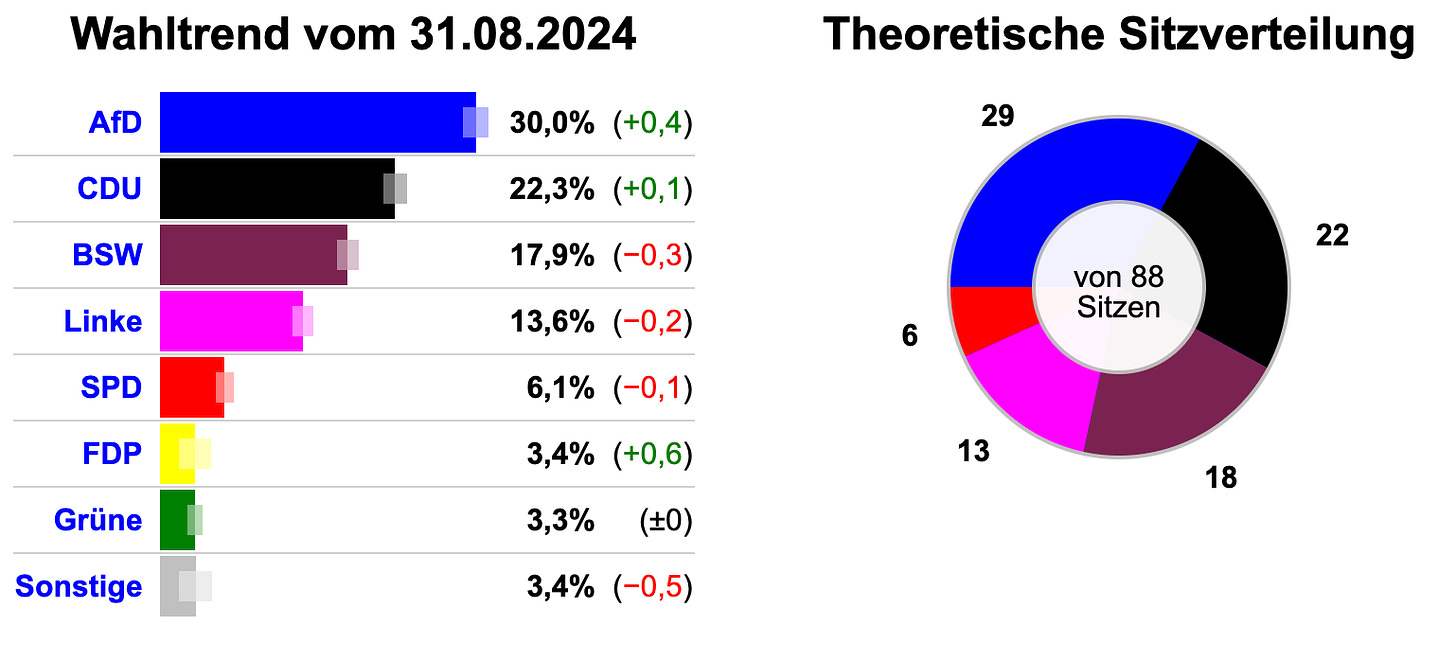
In Saxony, on the other hand, the establishment may still squeak out another term. The latest polling there suggests that the present coalition of CDU, SPD and Greens may claim just enough seats to form a slim majority government:
There are three things to keep in mind ahead of the results:
- The Bündnis Sahra Wagenknecht (BSW), or the Sahra Wagenknecht Alliance – which split off from Die Linke last year – commands broad support in both Thüringen and Saxony. Sahra Wagenknecht has ruled out any possibility that her party will cooperate with Alternative für Deutschland. She has also demanded that other potential coalition partners oppose the stationing of U.S. mid-range rockets in Germany and further weapons deliveries to Ukraine. It is an attempt to leverage state politics for national foreign policy outcomes.
- Barring serious intra-party political shifts, it is therefore unlikely that the AfD will enter government in either Thüringen or Saxony. That does not mean it will be powerless, though. In Thüringen, the question is whether the AfD will achieve enough seats in the Landtag to form a so-called blocking minority, or a Sperrminorität. Polls have it directly on the cusp of this crucial threshold. Everything that requires a two-thirds majority of parliament to decide – above all amendments to the state constitution and the election of state constitutional judges – would become impossible without the cooperation of an AfD with more than two-thirds of the parliamentary seats. Saxony distributes seats somewhat differently, making it less feasible for the AfD to achieve the same thing there, even though it’s polling about the same in both states.
- Beyond the AfD, the big question is what kind of governing coalitions will be possible, if the BSW won’t work with the CDU because of its anti-Atlanticism, and nobody including BSW will work with the AfD. There is, as I said, a good chance that the present CDU-SPD-Green coalition of Saxony survives this election, but Saxony will face a serious chance of political crisis if it doesn’t. The chances of crisis are even higher in Thüringen, where as I said the Left-SPD-Green coalition is done for.
UPDATE: The first prognoses are out. ZDF puts the Saxon election as follows…
…and the Thüringen election like this:
ARD has its own prognoses that look somewhat worse for AfD.
UPDATE 2: Current vote counts in Thüringen and Sachsen from state-media assholes at ZDF. AfD and CDU are fighting hard for first place in Saxony, with 31.4% and 31.7% respectively. AfD exceeding polls, ensuring political chaos in Thüringen with 33.2%.
UPDATE 3: Here are the final, official election results for Thüringen:
And here is the distribution of seats in the state parliament:
The Greens did not even make it over the 5% hurdle for representation, and the Left Party (Die Linke) have been neatly split by the Bündnis Sahra Wagenknecht (BSW). The old SPD-Left-Green minority Government is history, but who will govern in its place? To maintain its cordon sanitaire against the AfD, the CDU will have to enter a coalition with the wildly unpopular SPD and with the hard socialists and anti-Atlanticists of the BSW. Even that extreme compromise, however, will not be enough for a majority Government, because the CDU, the BSW and the SPD together are one seat short of a majority. The CDU will have to strike some further arrangement of toleration with the Left Party, all merely to discredit itself over the next four years in a weak politically incompatible coalition that exists not to achieve any concrete goals, and not to make anybody’s life better, but only to keep the AfD out of power. Nor will it be possible to shut out the AfD entirely; its 32 seats are more than enough to constitute a blocking minority. It’s strong enough to obstruct amendments to the state constitution and certain judicial appointments – all opportunities at which it can demand concessions.
In its attempt to wall the AfD out, the CDU in Thüringen has walled itself in. The party is slowly destroying itself, and after four years governing with social democrats and Leftists its popularity will only have eroded further. That is why the Thüringen election matters. The wheels are coming off the party cartel machine here, right before our eyes.
Things are not quite as grim for the cartel parties in Saxony, but they’re far from great. There, the urban population in Dresden and Leipzig is sufficient to keep the Greens in parliament, if just barely:
A last-minute “correction” to the election results has deprived AfD of a blocking minority in the Saxon Landtag, but the prospects for the party cartel system are far from rosy. The current CDU-SPD-Green coalition is now three seats short of a majority.
The CDU will have to court the BSW as a new coalition partner, and here it’ll face all the same longer-term problems as its counterparts in Thüringen.
As a direct result of unfavourable elections and its ongoing schemes of triangulation to maintain a lock on power, the party cartel system has largely lost its ability to govern effectively. This is the central problem with the traffic light coalition under Chancellor Olaf Scholz, and it will be the curse of whatever coalitions emerge to govern Thüringen and Saxony as well. What is more, the cornerstone of the cartel system – the CDU – is slowly being ground to dust by the cordon sanitaire. This is a self-reinforcing failure. To keep the AfD out of power, the CDU must govern in ever larger and more impotent coalitions with Leftist parties, which coalitions drive it ever further from its Right-leaning base and steer more support to the AfD, which the CDU can only counter by entering still more compromising coalition arrangements.
This article originally appeared on Eugyppius’s Substack newsletter. You can subscribe here.

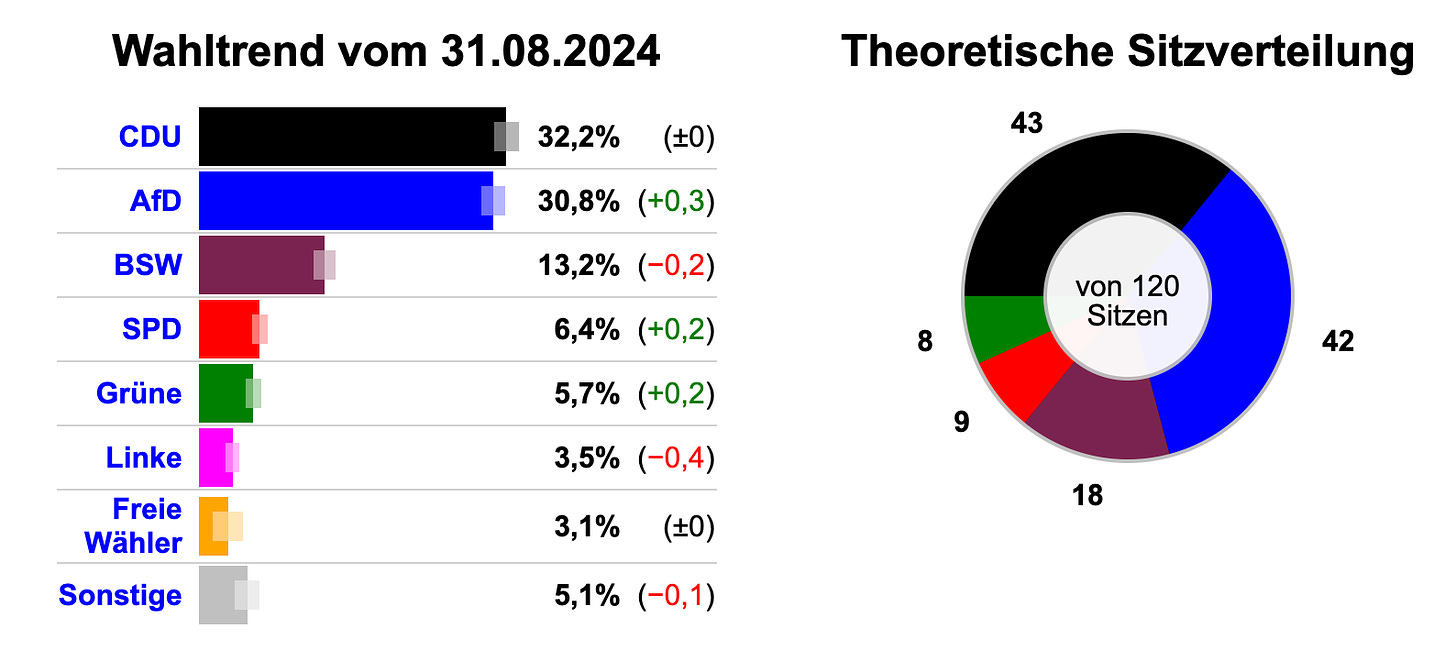
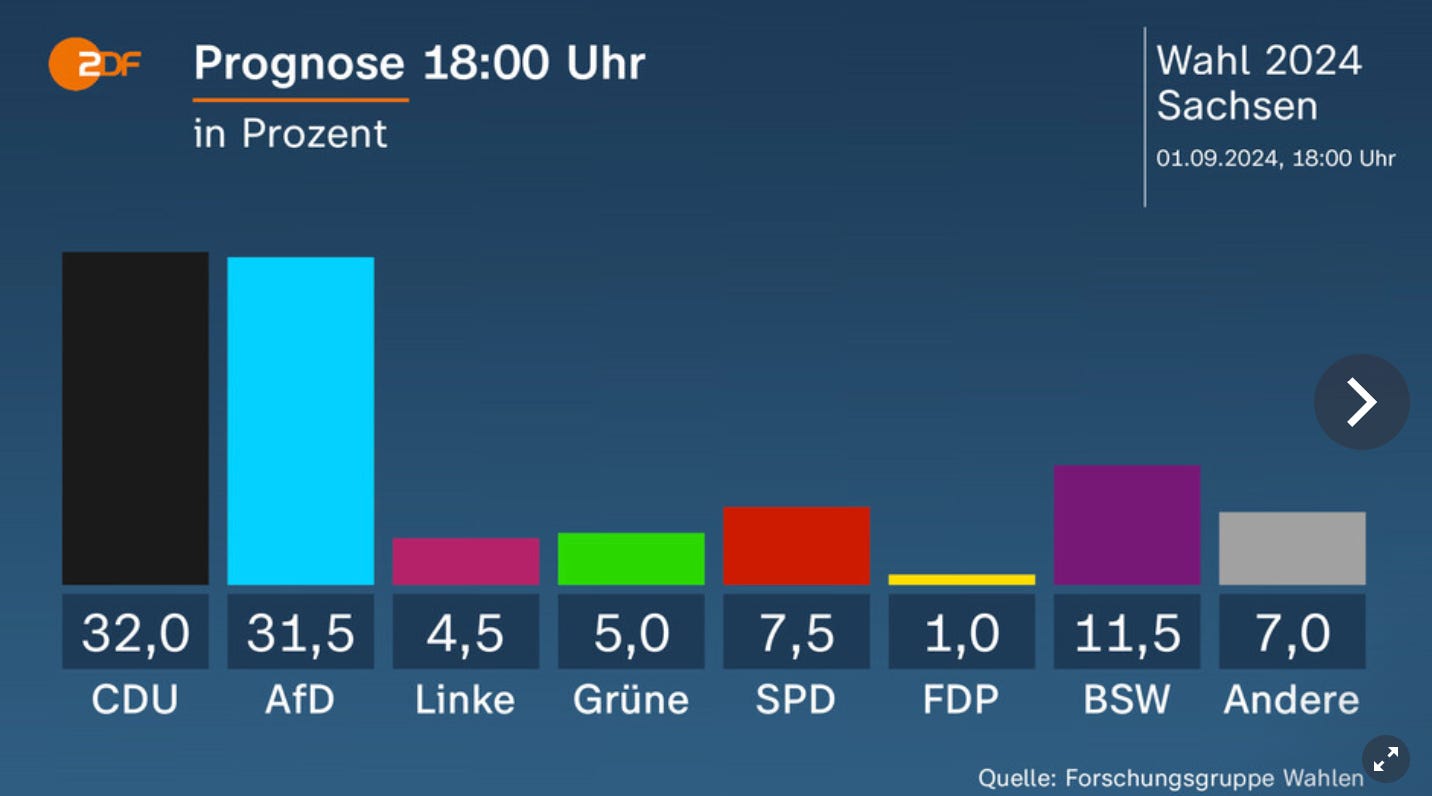
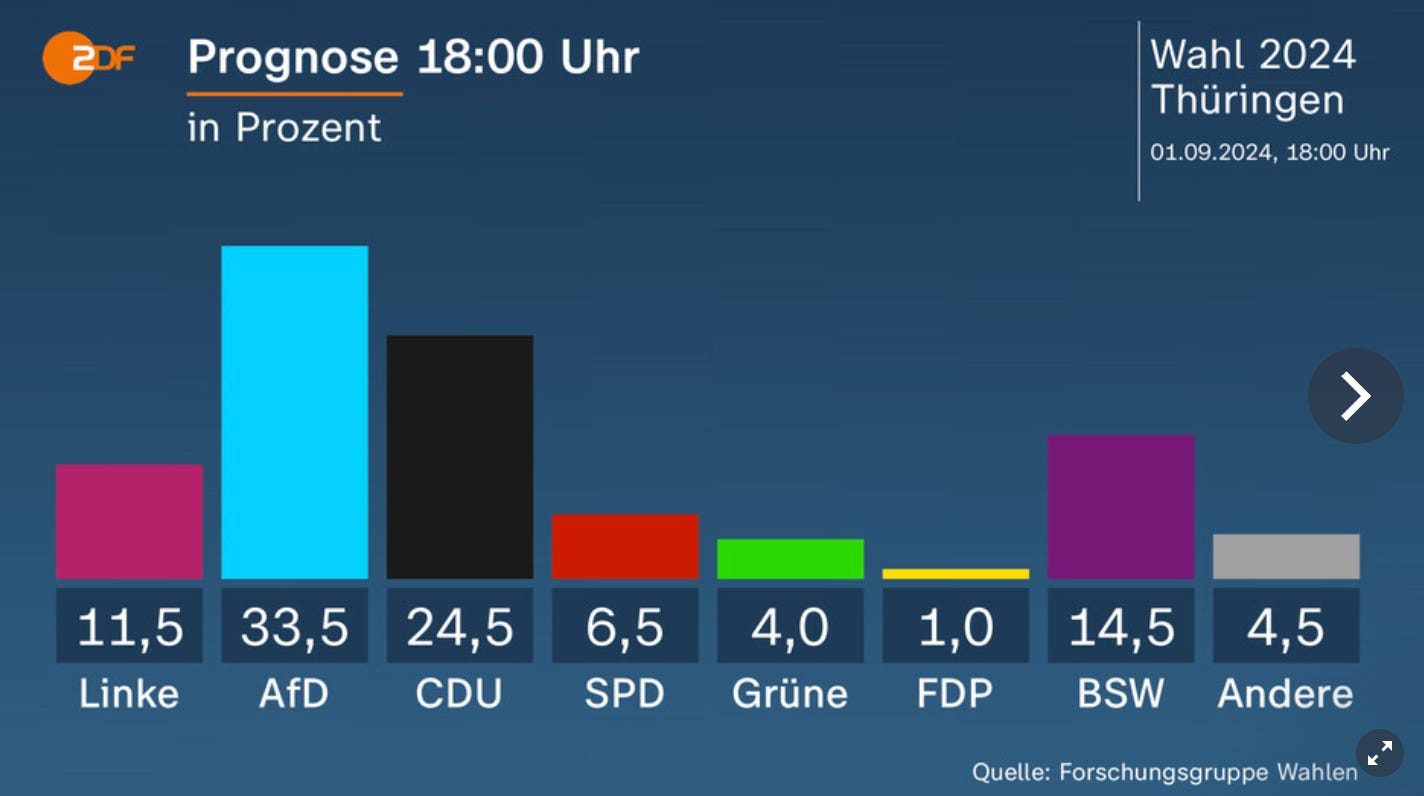
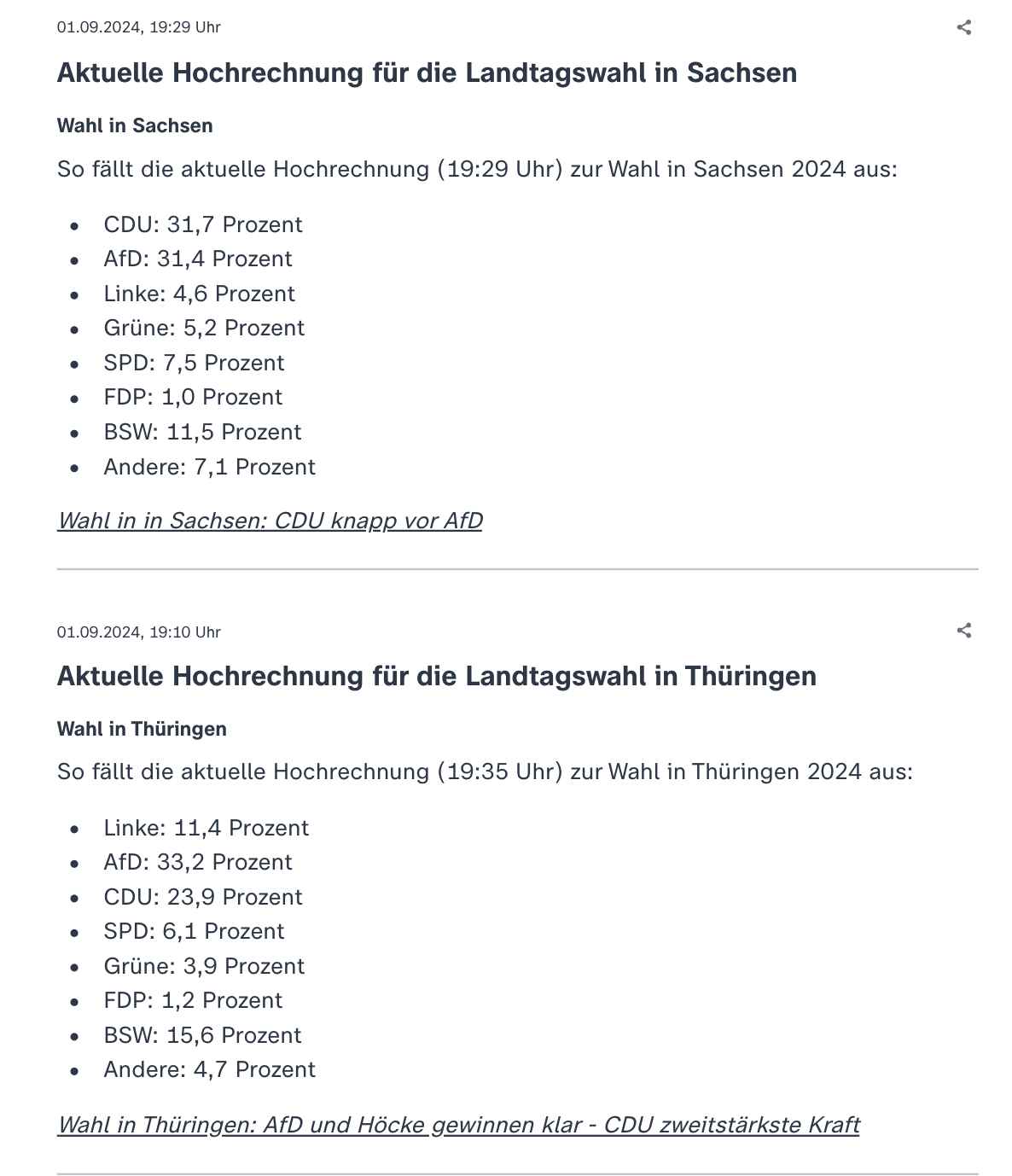
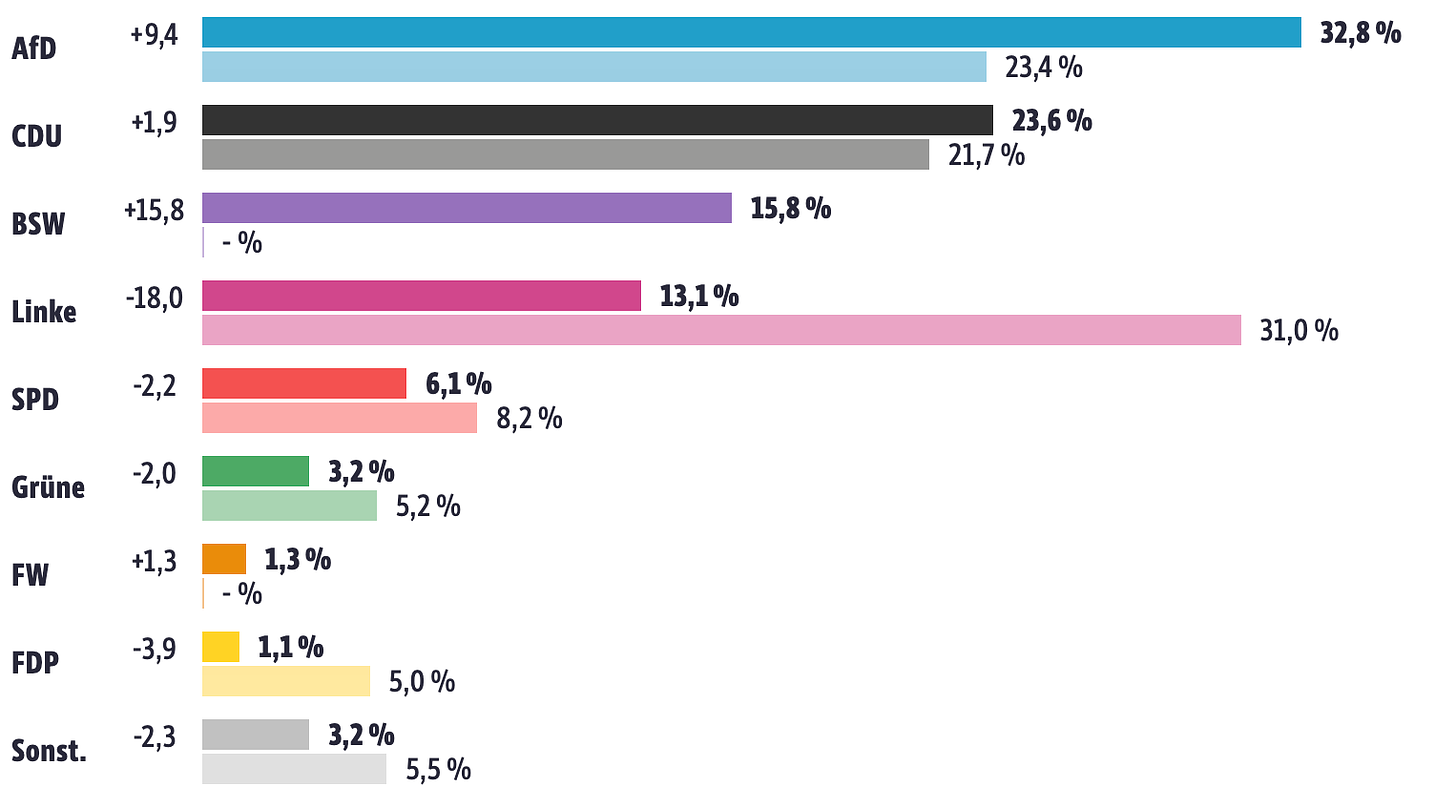
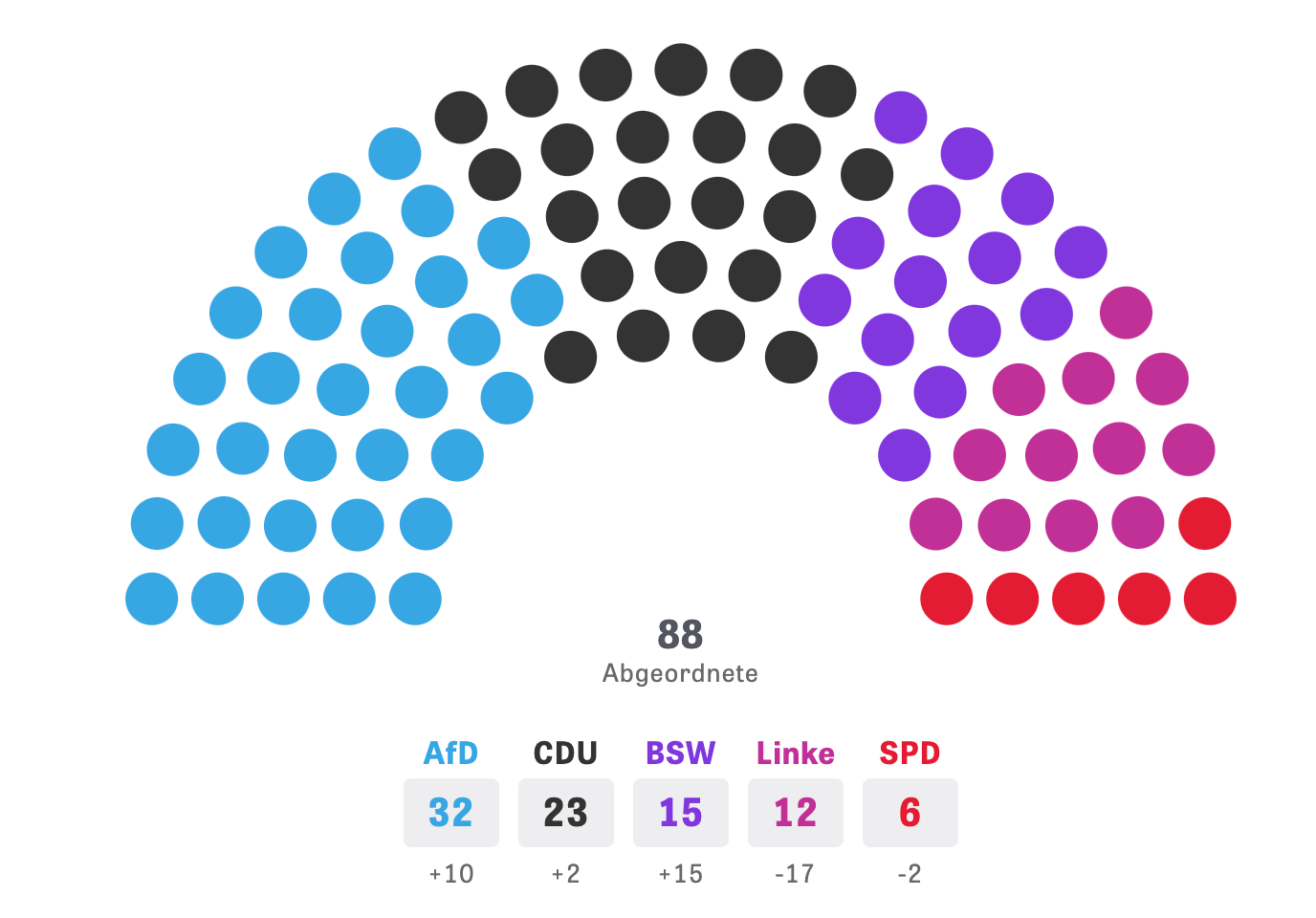
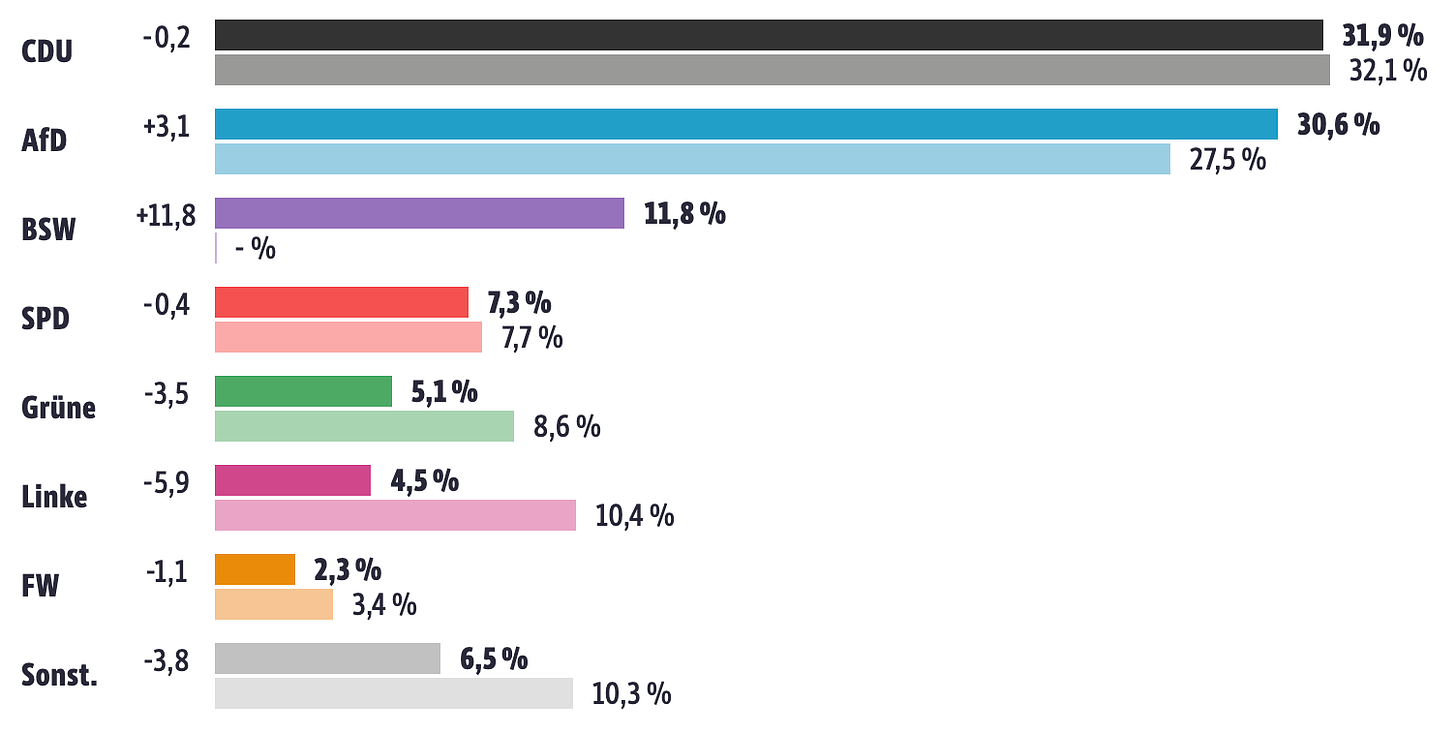
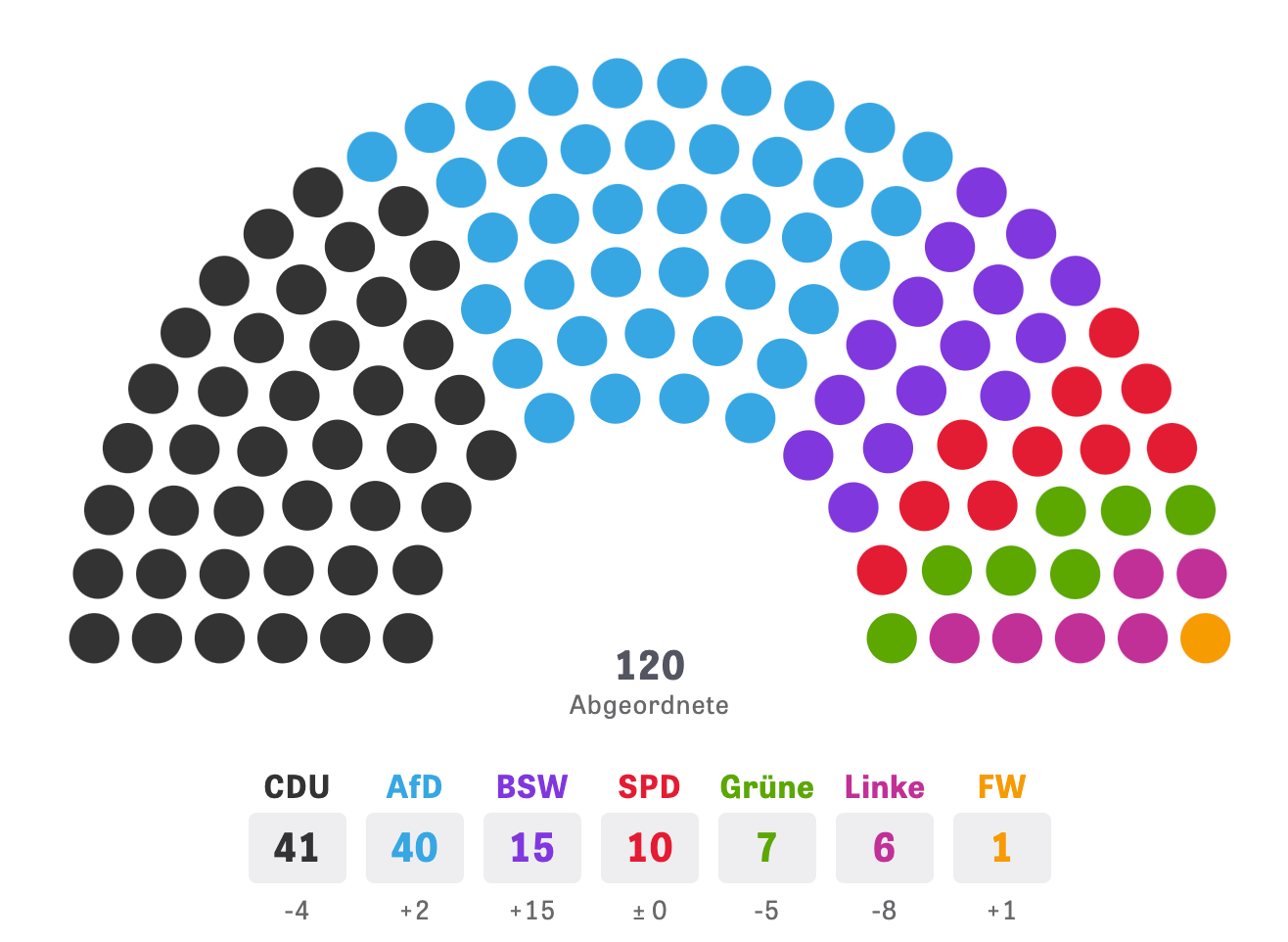













To join in with the discussion please make a donation to The Daily Sceptic.
Profanity and abuse will be removed and may lead to a permanent ban.
Meanwhile, also in Germany, if you were confronted by someone with a machete who wanted to kill you would your first instinct be to sing? Are they basing this on evidence that singing has proven more effective at scaring off a would-be attacker than merely screaming ”help!”? Bizarro;
”As knife crime becomes more of an “everyday” part of life in Germany, more and more people are concerned about how they should respond if they are attacked or threatened with a knife. The Berlin police’s tip to “sing loudly” has now been dropped from their website after being widely mocked on X.
“A screenshot of our homepage has been circulating for a few days, according to which we recommend that in the event of an attack, you irritate the perpetrator through unexpected behavior, such as singing,” write Berlin’s police. However, they then go on to write that they have removed this advice from their website.
“This is recommended by the professional associations for psychiatry, among others. However, this advice does not correspond to our police experience and has therefore no longer been part of our recommendations since 2023. The flyer was already updated, now our website is too.”
However, the “tip” also sparked broad coverage in the German media, with Berliner Zeitung writing in response to the advice, “What sounds like a bad joke is actually meant seriously. The police give Berliners tips on how to deal with violent situations on their website and write that ‘statistically speaking, many will never get into” such a situation. On the other hand, 48,200 physical assaults were recorded last year, the highest number in 10 years, which reduces many people’s sense of security.”
https://rmx.news/crime/germany-after-being-widely-mocked-berlin-police-drop-recommendation-to-sing-if-you-face-a-knife-attacker/
For everyone who is concerned about migration or being attacked by a knife wielding follower of the Qu’ran who wants to part your head from your shoulders, there is some light relief.
You are of course one of Starmfuhrer’s ‘Far Right’. Although it seems it is his national socialist party which is in fact antisemitic racist and fascist with the Far Left rent-a-mob supporters calling for the murder of all Israelis and Jewish people ‘from the river to the sea’.
You can now advertise your new found ‘Far Right’ status and concerns with a range of ‘Far Right’ T-shirts and personal accessories like ‘Far Right’ shopping bags.
Found here:
https://loveteesfreedom.teemill.com/collection/new/
Far Right about Everything
far-right extremist (organic double-sided bag)
“Far Right about everything’
far-right extremist (organic men’s T-shirt)
“Far Right about everything’
And yes, Black people are just as scared as the rest of us and are By Far White in Spirit even if not in skin colour – I know from discussions – same fears as the rest of us.
Of course, not all muslims want to cut our heads off and they are scared too of being thought they agree with that.
But it is in Qu’ran. Just dandy for extremists who want to claim God’s blessing.
“Far Right about everything’
far-right extremist (organic double-sided shopper bag)
far-right extremist (organic bag)
far-right extremist (organic women’s scoop T-shirt)
And many other options.
The WEF version of the ‘Far Right’ in the UK is – its the Russians and Chinese spreading misinformation on the internet – as described in the article extracted below and republished by the WEF.
The problem is this appears to be WEF and Royal United Services Institute (RUSI) misinformation. As we learned on 7th August from the BBC:
Unfortunately, the BBC piece is by Marianna Spring who is an expert in misinformation in rather more ways than one according to an accusation concerning the contents of her CV.
However, I can only go by news reports of that and cannot say if the accusation is true or not.
However it was reported in Spiked, The Telegraph and very many other legacy media newspapers and those reports remain online as this example and online search show:
The misinformation of Marianna Spring – spiked
marianna spring cv misinformation
So who knows what the truth is?
But RUSI provides no hard evidence to back up its claims.
It could after all be our own government or those connected with the WEF or the US government – who knows what the truth is.
The question is – who benefits.
Follow who benefits is the same as follow the money.
_______________________________________
How Did Foreign Actors Exploit the Recent Riots in the UK? Joe Morley-Davies
28 August 2024 8 Minute Read
The amplification of far-right narratives by foreign threat actors during the recent UK riots demonstrates the need for greater attribution and understanding of influence campaigns in an increasingly populated world of disinformation.
Another difficult result for proportional representation where you end up with the team the least people voted for just like our results.
I wonder what a second round of just the top three – CDU, AfD and BSW – would bring? It could go either way for AfD.
Probably the same as France – idiotic white people vote for their own destruction
You summed it all up perfectly:
“Idiotic white people vote for their own destruction”.
They baffle me and make me more angry than the immigrants – at least some of the legal ones.
Of course most are just useful idiots manipulated by evil people for evil ends.
The “Far Right” label is a very deliberate mechanism for rendering all those votes ineffective.
It makes the the party so toxic that any coalitions are impossible. After all who wants to associate themselves with “far right extremists”.
That’s what they’ve done in Germany. That’s what they’ve done in France with Le Pen. That’s what they’ve done in the Spain with Vox. That is what they are trying to do in the UK with Reform.
In a system where coalitions matter the “Far Right” label is in effect the deliberate disenfranchisement of anyone who votes for any of those parties. If they can’t stop them, the next best thing is to isolate them.
That’s what the Spectator (no less) is doing in England now, with a cover displaying three arms of people wearing brownshirts raised in a Nazi salute and with Alt Reich written on it, presumbly, a play on alt-right and asking “Is the German far right about to go mainstream?”
Politically, the AfD is really just what the CDU was before Merkel turned it into the Alt-SPD. But the people with the Nazi stickers don’t really care for that. You’re either in favour of all their political cause, from climate policies and limitless mass immigration to the transexualisation of mankind. Or, one of these stickers gets applied to you.
The people running the Spectator ought to be thoroughly ashamed of themselves, not the least because they’re violently pro-Israel and the AfD, like all German mainstream parties, obviously supports this as well.
The Liberal Progressive coalition of handwringing UN/WEF parasites are determined that any right of centre thought is to be illegitimate and even criminalised.
It’s probably more correct to write right of left instead of right of centre because the AfD is absolutely centre-right. It’s just that this is nowadays really far to the right of all other larger German parties. Even CDU top-candidates (Friedrich Merz) will drop soundbits re: How they abhor the concept of German Nation. That’s not how they handled this topic in 1990.
The BSW will reach a deal with the other parties and form a coalition against the AfD – that’s my bet. They will make some concessions to the BSW, and the BSW will scale back their demands – it’s win-win for both of them.
Haha, it’s The Times, so of course the article resembles a desperate attempt at a smear campaign;
”Alternative for Germany (AfD) is widely regarded as the first hard-right nationalist party to win a regional state election since Nazi rule after seismic election results on Sunday.
Saxony and Thuringia have long been AfD strongholds and the party is most popular among Germans in the former Democratic Republic (East Germany). It has thrived in areas where issues of economic and political integration persist after the fall of the Berlin Wall. The party has been characterised by its anti-establishment, populist views.
The AfD was founded in 2013 in the aftermath of the financial crisis. The party protested Germany’s efforts to bail out poorer countries in the European Union. It was originally envisioned by economists as an anti-Euro party.
It soon morphed into a movement focusing on the issue of migration after the 2015 refugee crisis when then-chancellor Angela Merkel opened the door to more than a million refugees from war-torn countries such as Syria, Afghanistan and Iraq.
“Islam does not belong to Germany,” read the party’s 2016 manifesto. An AfD tagline from 2017 read: “Burkas? We’re more into bikinis”. “Unser Land zuerst,” which translates to “Our country first!” was written on AFD campaign banners in 2022.
As real wages dipped to below 10 per cent below their pre-crisis trends last year, many seemed willing to blame immigration.
The AfD’s immigration platform marks a major departure from the status quo. Policy ideas include doing away with individual asylum hearings and setting up holding camps abroad that prevent people from entering Germany.
The party has said it wants to cap immigration, which would aim to reduce migration down to net zero.”
https://www.removepaywall.com/search?url=https://www.thetimes.com/world/europe/article/what-is-afd-hard-right-germany-politics-saxony-thuringia-pnkrmx5p0
Reminded me of this quote from LOTR:
“Authority is not given to you to, steward, to deny the return of the king.”
It’s one thing to form coalitions “naturally” but another to do it specifically to deny the will of the people.
How long can this situation across all of Europe hold – where the peoples wishes for democratic representation are thwarted by our out-of-touch Elites?
How is 30odd % of those who voted “the will of the people”? Were I German, I would have viewed this election as a referendum on immigration. The majority voted to have more of it (or I guess like some here were deluded into think the sabre-rattling from the nominally “right wing” party would turn into action).
That’s a gross misinterpretation because people vote tribal, ie, they vote for other people they believe to know and happen to trust, not neccessarily for what’s in the manifestos of the various parties before the election and absolutely not for what members of the government do or want to do afterwards which wasn’t in any party manifestos (like Starmer’s internet persecution of the faa rite or his Finally end smoking! initatives).
It’s usually telling to interpret the outcome of PR elections in the reverse, based on the assumption that people voted for the party they wanted to govern. For Thüringen (let’s Kviy this a little and extend the courtesy to use the proper names to Germans), the outcome was thus
67.2% opposed to the AfD
76.4% opposed to the CDU
84.2% opposed to BSW
86.9% opposed to Die Linke (SED)
93.9% opposed to the SPD
96.8% opposed to Bündnis 90/ Die Grünen
All of these parties a strong to overwhelming majority of the people doesn’t want to govern minus the Greens will get seats in parliament based on this vote of extreme popular disapproval. Shome democracy, for shure!
Lastly, there’s the theory behind PR voting systems which claims that the party which got the largest vote share is the one which won the election and which is thus entitled to govern. That’s based on the assumption that all parties are created equal and all democratically legitmated parties, which the AfD obviously is, must principally be willing to cooperate with all other demcratically legitimated parties, details to be threshed out in coalition negotations. This means the AfD wouldn’t stand a chance to implement any faa rite policies unless its coalition partners would agree to that which they obviously wouldn’t. But this doesn’t matter here. It was decreed that the AfD represents the wrong kinds of German who really ought to be disenfranchied to “save democracy” and as this would look kind-of bad when done formally (stripping about ⅓ of the people of their right to vote) it can perfectly well be achieved informally which has the exact same effect, just without anyone having to admit that. Sixtuples all around!
It’s time people started reading manifestos, though those often contain lies. IMO if you’re voting for any of the Uniparty parties in whatever country you live, you’re not paying attention and deserve what you get.
That’s like saying people who opted into getting covaxxed deserve sudden deaths and other serious health problems and I don’t think so. The responsibilty for misselling something rests with those who did it and not with those who fell prey to it.
I certainly don’t wish anyone dead.
Democracy only works if people pay attention.
An observation like that marks you as enemy of the ‘democracy’ which only works because people don’t pay attention.
Indeed. I wonder what things would look like if people really did pay attention? Part of the problem I think is that our expectations are always increasing, and expecting forever better government is unrealistic.
Sadly one might as well say it is time people started believing what the BBC publish and broadcast.
Here is a main take-away of the recent elections and of the Conservative Party leadership contest.
1) who is spelling out exactly what the problems are that need to be fixed?
2) who is spelling out exactly how they are going to fix them?
Remember Starmer’s ‘smash the gangs’?
A meaningless soundbite which he kept repeating without being explicit about how that would be done.
Now he is going to put the blame on Germany and France for his continuing failure to ‘smash’ any gangs.
He met Shultz and Macron supposedly to get their help.
To date – zero gangs smashed.
And that will hardly change at all.
Both countries have failed and judging by the recent German elections the ruling elites want to continue with unfettered illegal immigration across Europe despite the concerns of large number of voters.
Indeed.
And look at how weak governments become with PR.
Nothing can be done.
A transferable vote system might be better which sees only the two or three parties gaining the most votes with seats in Parliaments and forming governments.
It is not ideal but better to have a government which can act than one which cannot.
I’m generally extremely opposed to try to make anything work by making it more complicated. But I’m convinced that attempts to fix the system of self-governing parliaments are a fool’s errand, anyway. The original purpose of a parliament was to represent the people in dealing with a king in two areas: Trials of serious crimes and taxation. Starting from the middle of the 19th century, parliaments have instead ursurped the position of the king, thus leaving the people without representation. Parliamentary government is really a contradictio in adiecto: An entity which governs cannot ever be a parliament.
Your thriving ‘democracy’ hard at work. ‘Your vote counts’. ‘Saving our democracy’, ‘saving our rights’, ‘our freedoms’, ‘our free speech’, ‘our values’…..
All horseshit.
Statism. You get one choice: Elite Statism – which will implement whatever the hell they want to.
As Europe sees swings away from Liberal Progressive tyranny, we in the UK are swimming against the tide and have just elected a mass immigration, phony planet saving, pensioner murdering bunch of UN hand wringing parasites for the next 5 years.
How many votes did Kevin Phillips-Bong (Slightly Silly) get?
Precisely the same thing happened in the Netherlands with Geert Wilders.
But how strange is this!
German Jews feel ‘sucker punched’ after first election of far-Right since Nazis (msn.com)
Really? German Jews don’t complain about the Islamic Horde invading Germany, but as soon as German Patriots vote to oppose the Islamic Horde invading Germany, the German Jews shriek about “Nazis”??? Whose side are they on???
That’s especially idiotic because the AfD is adamantly committed to everything German parties are supposed to be committed to be considered mainstream which obviously includes being pro-Israel and pro masssive state support for Jews living in Germany “because of historical responsibility” etc. It’s just that these “representatives” and their far left political allies really don’t care. You’re either one of them. Or you’re a Nazi!!1. What opinions you actually happen to hold on any particular topic really doesn’t matter for that.
Thanks for that clear explanation. Here is a confirmation of that:
American activist Barbara Lerner Spectre calls for destruction of European ethnic societies – YouTube
Jewish American activist Barbara Lerner Spectre said in Sweden,
“I think there’s a resurgence of Anti-Semitism, because at this point in time, Europe has not yet learned how to be multicultural.
And I think we’re going to be part of the throes of that transformation, which MUST take place.”
“Europe is not going to be the monolithic societies they once were in the last century”, she said with a patronising smile.
“Jews are going to be at the centre of that. It’s a HUGE transformation for Europe to make.
They are now going into a multicultural mode, and Jews will be resented because of OUR LEADING ROLE.
But without that leading role, without that transformation, Europe will not survive.”
Perhaps she should turn to the apartheid state of Israel and sort that out first!